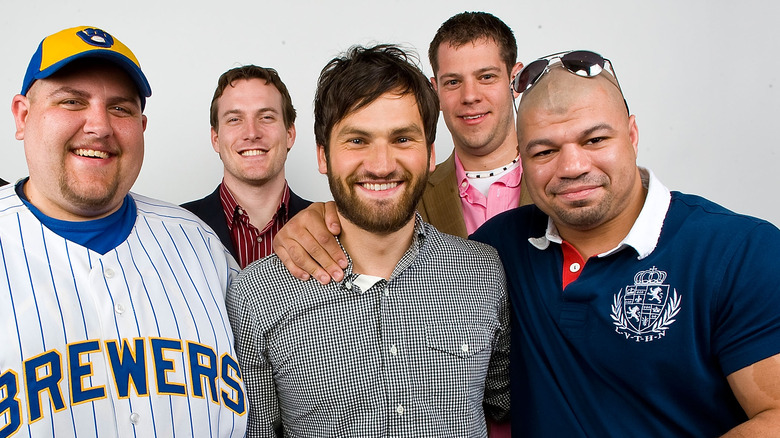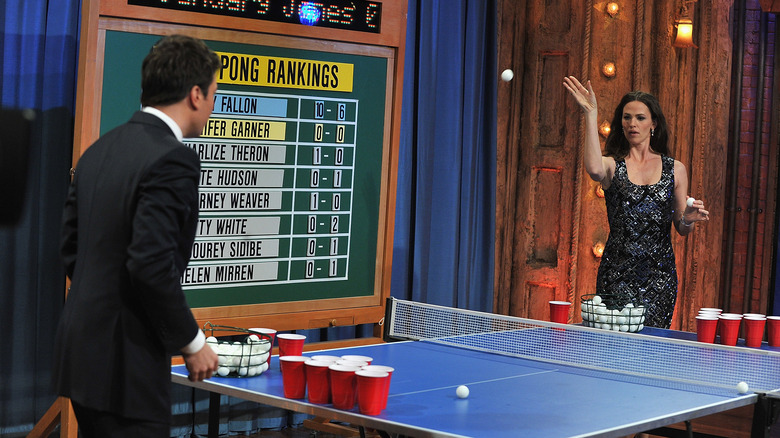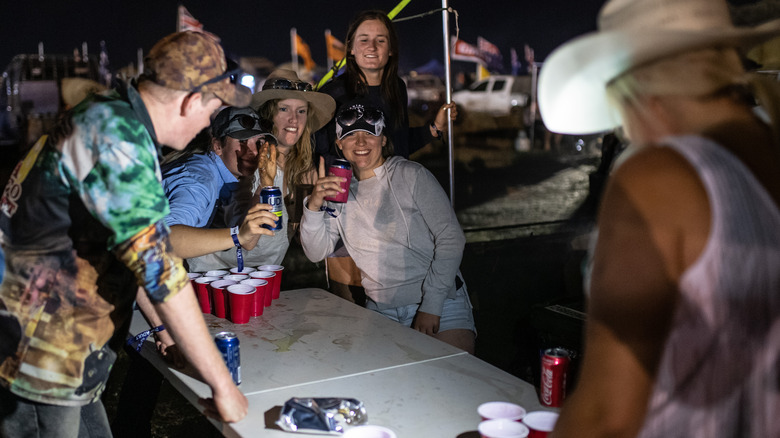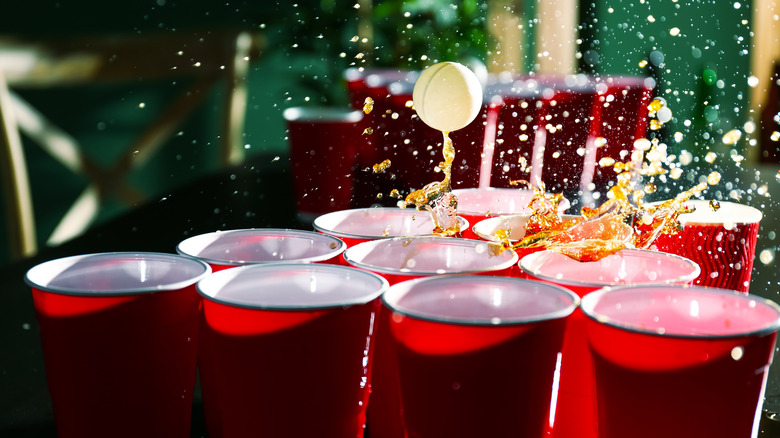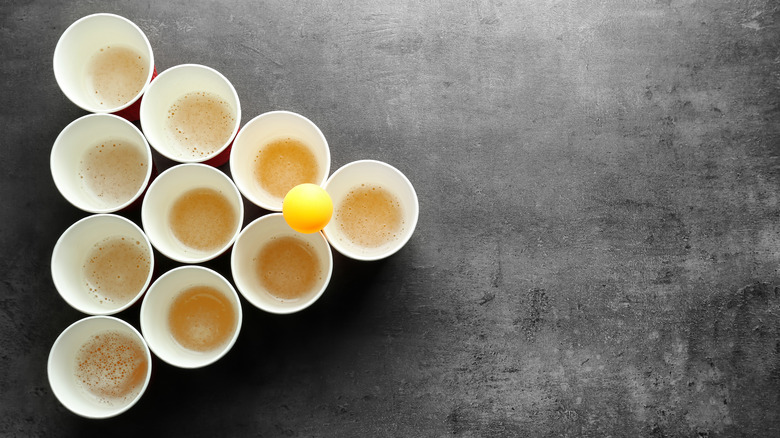Inside The World Series Of Beer Pong
Beer pong has long been the sport of frat houses and unsupervised high school parties. It's a game about tossing plastic balls across a ping pong table, aiming for cups of beer, and, well, drinking. As with most drinking games, the loser of beer pong ends up imbibing the most alcohol. But — as Bleacher Report notes — unlike other games like king's cup, the goal isn't just to get drunk — beer pong is a "drinking sport" with rules and strategies that bring it much closer to something like table tennis. And for some, it's a sport worth training for.
It makes sense, then, that someone would try to legitimize the game as a bonafide competitive organized sport for frat boys and ex-athletes alike. Enter the World Series of Beer Pong: the ultimate test of skill for the top echelon of beer pong contenders. It has all the hallmarks of an amateur sport gone pro, from a Jerry Dior-style logo to an official rulebook.
The birth of WSOBP
According to Bleacher Report, the World Series of Beer Pong has its roots in the website BPONG, created in 2001 by Billy Gaines. Gaines (center in the above photo) originally created BPONG as a kind of social network for beer pong players. Gaines was anything but a frothing frat boy; he kept a busy schedule at Carnegie Mellon University and later headed for law school. He simply loved beer pong — a fascination he shared with his fellow students. Rather than leave the game in the past, he built the BPONG website and forum to spread the game beyond Carnegie Mellon's campus.
Much like the esports craze of today, with an online community came frequent tournaments with cash prizes. So, in an effort to unify the sport, BPONG hosted the World Series of Beer Pong in 2006. While the COVID-19 pandemic has restricted recent competitions to virtual "quarantined" games, previous years have seen hundreds of players duke it out in Las Vegas with $50,000 in prize money on the (ping pong) table (via TIME). BPONG has even hosted fantasy beer pong tournaments to keep fans engaged as the game goes remote.
Setting the official rules
Broadly speaking, the game of beer pong is played by two teams of two who take turns throwing a small ball into their opponent's cups — 10 (filled with beer), arranged in a triangle. Any team on the losing end of a cup shot has to drink whatever's inside and discard it. The challenge (besides playing while drunk) lies in attempting each throw from either end of a ping pong table. Whoever clears all 10 of their opponent's cups wins.
Those are the basics, but as BPONG considers itself the arbiter of the sport, it also sets rules for both house parties and the World Series of Beer Pong. The official tournament rules at BPONG run more than 25 sections and sub-sections, setting the standards for everything from the contents of cups (water, ironically) to time limits per shot and even provisions for "Dips***(s) Not Paying Attention." The rules are in active contention, too, with recent updates in "v2018-03-001" making adjustments to regulations around leaning, bouncing, and which kind of distractions are allowed.
Keeping the atmosphere fratty
Despite the stiff ruleset, the World Series of Beer Pong still retains some of its frat house roots. Teams register with ridiculous, provocative names like "Death Around The Corner" and "White Girl Wasted" (via the BPONG blog) and compete in a decidedly rowdy atmosphere where guests show up in costume and beer flows freely. And the party-like vibe at the WSOBP ensures that every player will be deafened by the boos and cheers of the crowd — a definite distraction. At Bleacher Report, WSOBP champion Brandon Marx said some players drink to block out that noise. But BPONG founder Billy Gaines added that getting sloshed isn't the goal: "We look out for each other so you don't get sucked into that party atmosphere."
Players come from everywhere, though many are frat boys and former athletes who still have a thirst for competition in their blood. In 2011, ESPN covered the sixth annual WSOBP and noted how teams comprised a wide range of players, from father and son pairs to local teachers.
A brewing industry
Besides the respectable prize pools, there's plenty of money to be made in the World Series of Beer Pong. Aficionados of the sport can purchase the only officially sanctioned tables straight from the BPONG website for about $200, along with a variety of apparel, posters, and party cups. The white World Series cups, however, don't appear to be for sale.
Creator Billy Gaines isn't necessarily drowning in cash, but it's earned him a chunk of change each year. Though Gaines hasn't disclosed his personal earnings, Bleacher Report claimed that the WSOBP pulled in about $100,000 in 2018, and the cash prize for the main event was set at $35,000 minimum for the most recent tournament (postponed due to COVID-19, per BPONG). Tickets for competitors run $295 per person and $590 per team, with spectators paying anywhere from $20 a day to nearly $200 for 4 days with a VIP pass. The WSOBP site claims their events regularly sell out, with side events selling out in "under an hour."
The next WSOBP
With COVID-19 still restricting organizers' willingness to put together a large in-person event, the future of the World Series of Beer Pong is uncertain. Instead, BPONG has hosted online events, most recently called "Quarantined: Virtual Beer Pong Championship" in 2020. This summer tournament was run by standard WSOBP rules but with modifications made for a virtual environment (via BPONG).
Groups met on Facebook Rooms video chat with an organizer present to monitor the game (though the official blog noted that "technical difficulties" necessitated a move to Zoom later on). Everything had to be made visible to the organizer by the players, from empty cups before the game begins to making shots with the sunk ball in view. Additionally, an "X-Factor" system was added to the doubles format, with individual players' win-loss records used to determine who wins the "pod" they've been seeded into each round.
Though the official BPONG blog and Facebook page haven't been updated in more than a year, the sport can rely on virtual tournaments and small local competitions to keep the game alive. Billy Gaines told Bleacher Report that beer pong is "just another activity that brings people together."

